Exploring Choline Supplementation for FASD: A Healthcare Dissertation
VerifiedAdded on 2023/03/30
|46
|10556
|454
Thesis and Dissertation
AI Summary
This dissertation investigates the potential of choline supplementation as a nutritional intervention for treating Fetal Alcohol Syndrome (FASD) symptoms, specifically focusing on intellectual and cognitive impairment in school children. The research employs a systematic review methodology, analyzing relevant literature from databases like CINAHL and Google Scholar to evaluate the effectiveness of choline supplementation. The findings suggest that choline supplementation can improve cognitive functions and memory in children with FASD, especially when combined with other interventions like special education and occupational therapy. The study also highlights the need for further research to validate the benefits of choline supplementation and genetic precision pharmacological interventions for children with FASD.
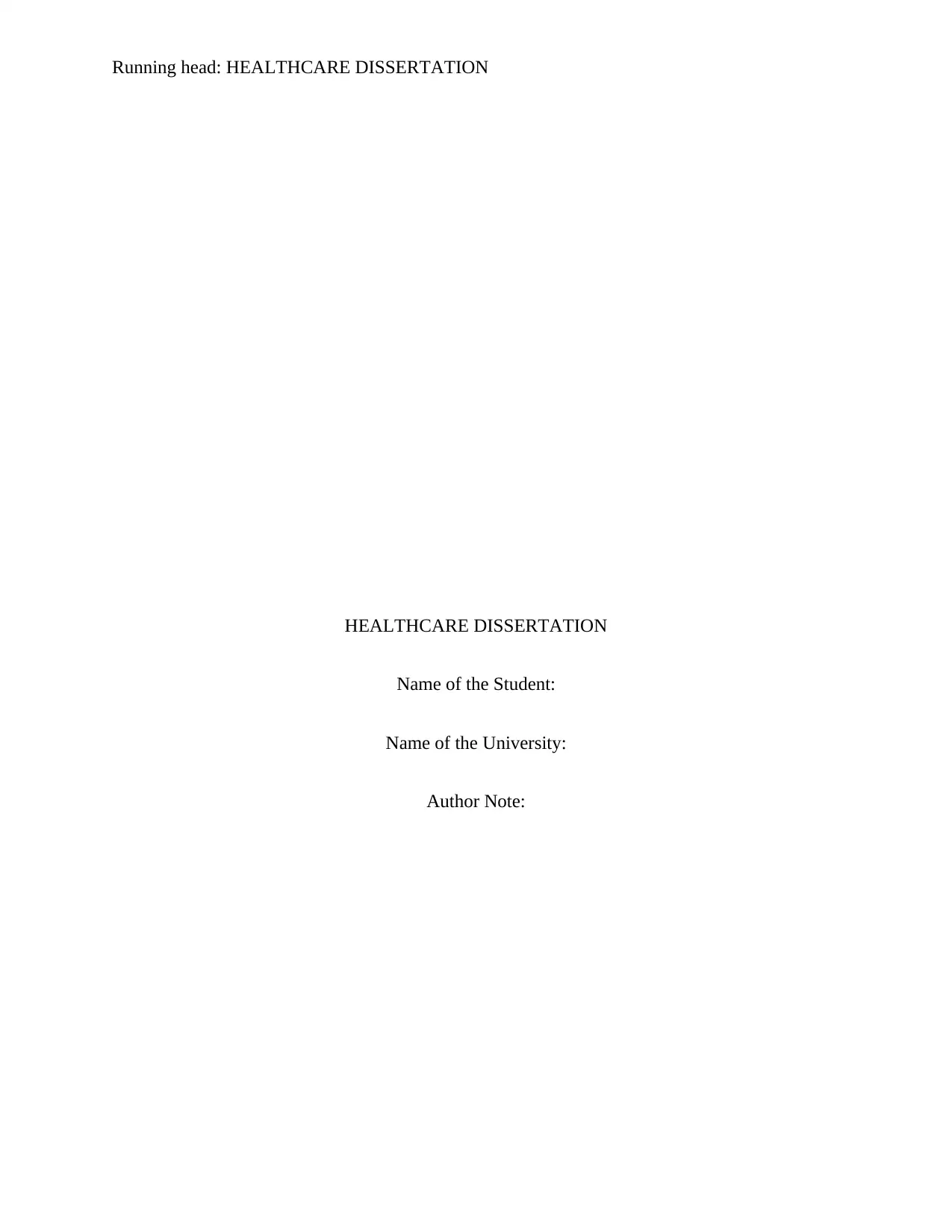
Running head: HEALTHCARE DISSERTATION
HEALTHCARE DISSERTATION
Name of the Student:
Name of the University:
Author Note:
HEALTHCARE DISSERTATION
Name of the Student:
Name of the University:
Author Note:
Paraphrase This Document
Need a fresh take? Get an instant paraphrase of this document with our AI Paraphraser
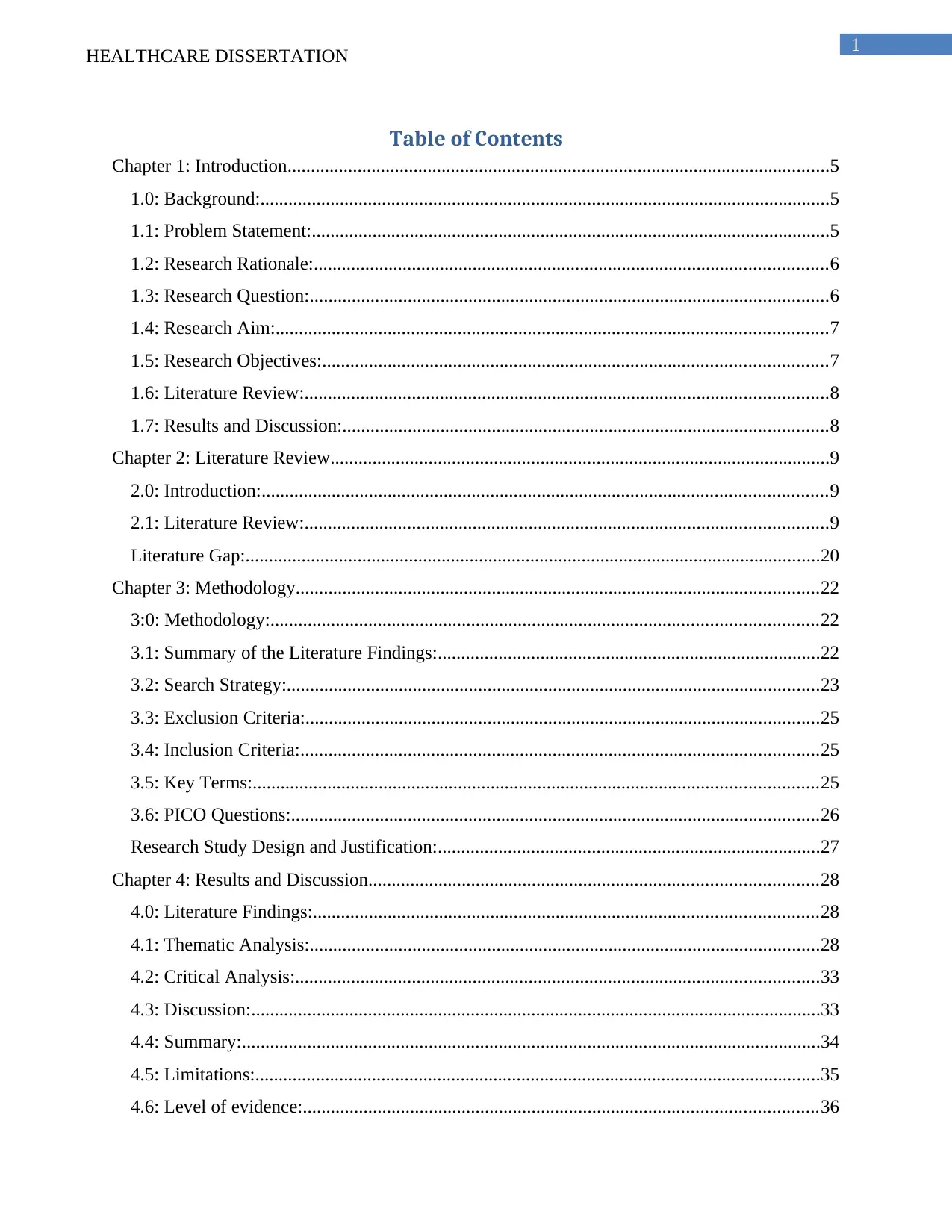
1
HEALTHCARE DISSERTATION
Table of Contents
Chapter 1: Introduction....................................................................................................................5
1.0: Background:..........................................................................................................................5
1.1: Problem Statement:...............................................................................................................5
1.2: Research Rationale:..............................................................................................................6
1.3: Research Question:...............................................................................................................6
1.4: Research Aim:......................................................................................................................7
1.5: Research Objectives:............................................................................................................7
1.6: Literature Review:................................................................................................................8
1.7: Results and Discussion:........................................................................................................8
Chapter 2: Literature Review...........................................................................................................9
2.0: Introduction:.........................................................................................................................9
2.1: Literature Review:................................................................................................................9
Literature Gap:...........................................................................................................................20
Chapter 3: Methodology................................................................................................................22
3:0: Methodology:.....................................................................................................................22
3.1: Summary of the Literature Findings:..................................................................................22
3.2: Search Strategy:..................................................................................................................23
3.3: Exclusion Criteria:..............................................................................................................25
3.4: Inclusion Criteria:...............................................................................................................25
3.5: Key Terms:.........................................................................................................................25
3.6: PICO Questions:.................................................................................................................26
Research Study Design and Justification:..................................................................................27
Chapter 4: Results and Discussion................................................................................................28
4.0: Literature Findings:............................................................................................................28
4.1: Thematic Analysis:.............................................................................................................28
4.2: Critical Analysis:................................................................................................................33
4.3: Discussion:..........................................................................................................................33
4.4: Summary:............................................................................................................................34
4.5: Limitations:.........................................................................................................................35
4.6: Level of evidence:..............................................................................................................36
HEALTHCARE DISSERTATION
Table of Contents
Chapter 1: Introduction....................................................................................................................5
1.0: Background:..........................................................................................................................5
1.1: Problem Statement:...............................................................................................................5
1.2: Research Rationale:..............................................................................................................6
1.3: Research Question:...............................................................................................................6
1.4: Research Aim:......................................................................................................................7
1.5: Research Objectives:............................................................................................................7
1.6: Literature Review:................................................................................................................8
1.7: Results and Discussion:........................................................................................................8
Chapter 2: Literature Review...........................................................................................................9
2.0: Introduction:.........................................................................................................................9
2.1: Literature Review:................................................................................................................9
Literature Gap:...........................................................................................................................20
Chapter 3: Methodology................................................................................................................22
3:0: Methodology:.....................................................................................................................22
3.1: Summary of the Literature Findings:..................................................................................22
3.2: Search Strategy:..................................................................................................................23
3.3: Exclusion Criteria:..............................................................................................................25
3.4: Inclusion Criteria:...............................................................................................................25
3.5: Key Terms:.........................................................................................................................25
3.6: PICO Questions:.................................................................................................................26
Research Study Design and Justification:..................................................................................27
Chapter 4: Results and Discussion................................................................................................28
4.0: Literature Findings:............................................................................................................28
4.1: Thematic Analysis:.............................................................................................................28
4.2: Critical Analysis:................................................................................................................33
4.3: Discussion:..........................................................................................................................33
4.4: Summary:............................................................................................................................34
4.5: Limitations:.........................................................................................................................35
4.6: Level of evidence:..............................................................................................................36
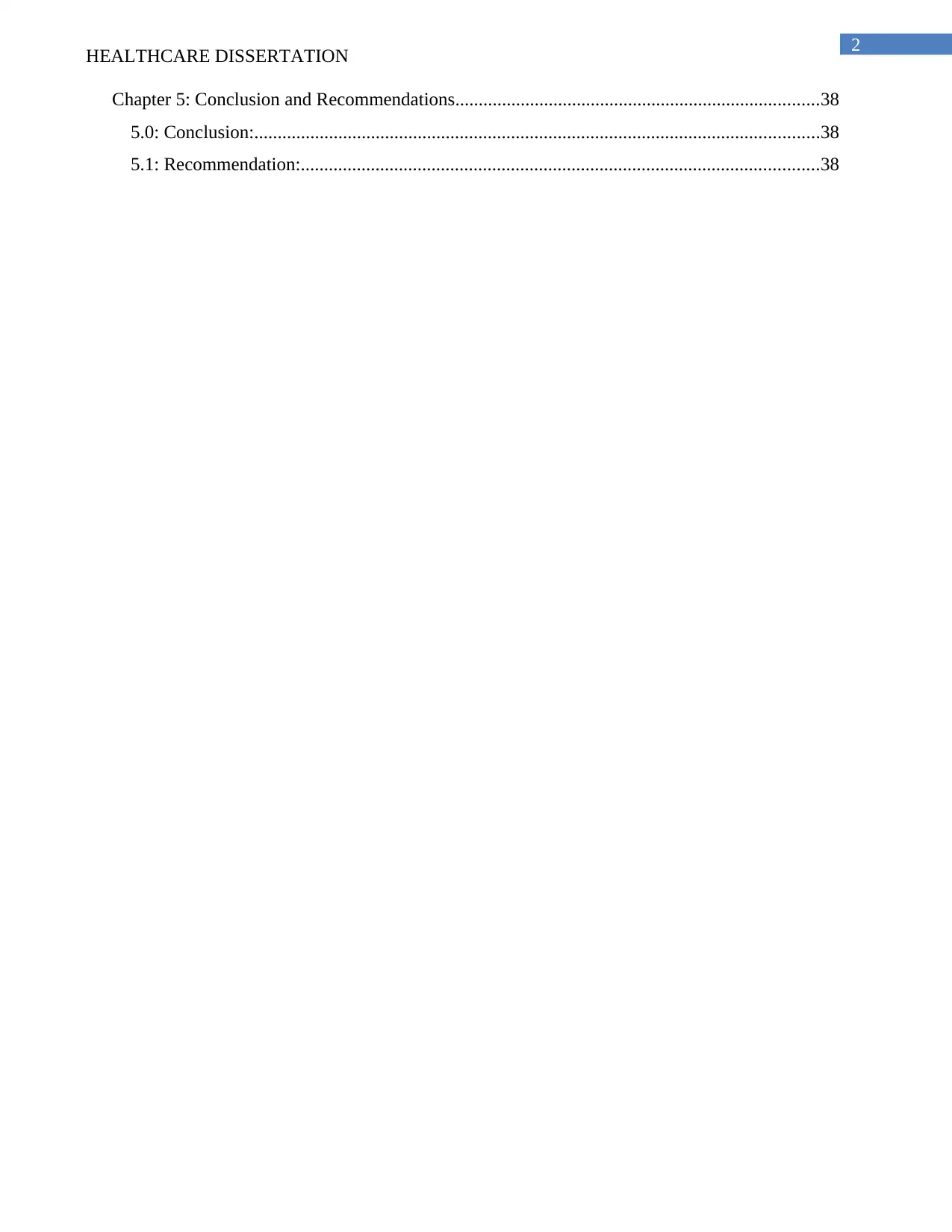
2
HEALTHCARE DISSERTATION
Chapter 5: Conclusion and Recommendations..............................................................................38
5.0: Conclusion:.........................................................................................................................38
5.1: Recommendation:...............................................................................................................38
HEALTHCARE DISSERTATION
Chapter 5: Conclusion and Recommendations..............................................................................38
5.0: Conclusion:.........................................................................................................................38
5.1: Recommendation:...............................................................................................................38
⊘ This is a preview!⊘
Do you want full access?
Subscribe today to unlock all pages.

Trusted by 1+ million students worldwide
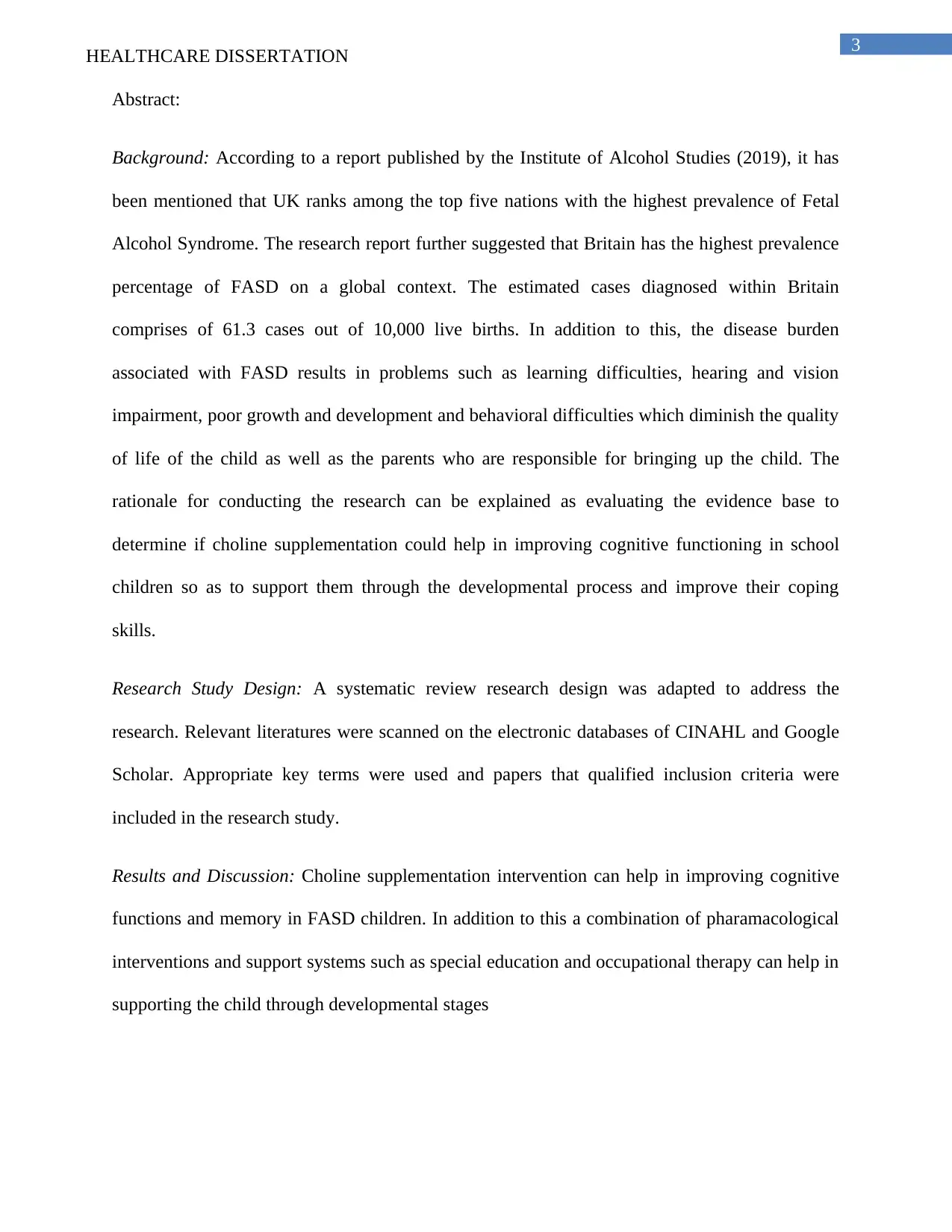
3
HEALTHCARE DISSERTATION
Abstract:
Background: According to a report published by the Institute of Alcohol Studies (2019), it has
been mentioned that UK ranks among the top five nations with the highest prevalence of Fetal
Alcohol Syndrome. The research report further suggested that Britain has the highest prevalence
percentage of FASD on a global context. The estimated cases diagnosed within Britain
comprises of 61.3 cases out of 10,000 live births. In addition to this, the disease burden
associated with FASD results in problems such as learning difficulties, hearing and vision
impairment, poor growth and development and behavioral difficulties which diminish the quality
of life of the child as well as the parents who are responsible for bringing up the child. The
rationale for conducting the research can be explained as evaluating the evidence base to
determine if choline supplementation could help in improving cognitive functioning in school
children so as to support them through the developmental process and improve their coping
skills.
Research Study Design: A systematic review research design was adapted to address the
research. Relevant literatures were scanned on the electronic databases of CINAHL and Google
Scholar. Appropriate key terms were used and papers that qualified inclusion criteria were
included in the research study.
Results and Discussion: Choline supplementation intervention can help in improving cognitive
functions and memory in FASD children. In addition to this a combination of pharamacological
interventions and support systems such as special education and occupational therapy can help in
supporting the child through developmental stages
HEALTHCARE DISSERTATION
Abstract:
Background: According to a report published by the Institute of Alcohol Studies (2019), it has
been mentioned that UK ranks among the top five nations with the highest prevalence of Fetal
Alcohol Syndrome. The research report further suggested that Britain has the highest prevalence
percentage of FASD on a global context. The estimated cases diagnosed within Britain
comprises of 61.3 cases out of 10,000 live births. In addition to this, the disease burden
associated with FASD results in problems such as learning difficulties, hearing and vision
impairment, poor growth and development and behavioral difficulties which diminish the quality
of life of the child as well as the parents who are responsible for bringing up the child. The
rationale for conducting the research can be explained as evaluating the evidence base to
determine if choline supplementation could help in improving cognitive functioning in school
children so as to support them through the developmental process and improve their coping
skills.
Research Study Design: A systematic review research design was adapted to address the
research. Relevant literatures were scanned on the electronic databases of CINAHL and Google
Scholar. Appropriate key terms were used and papers that qualified inclusion criteria were
included in the research study.
Results and Discussion: Choline supplementation intervention can help in improving cognitive
functions and memory in FASD children. In addition to this a combination of pharamacological
interventions and support systems such as special education and occupational therapy can help in
supporting the child through developmental stages
Paraphrase This Document
Need a fresh take? Get an instant paraphrase of this document with our AI Paraphraser
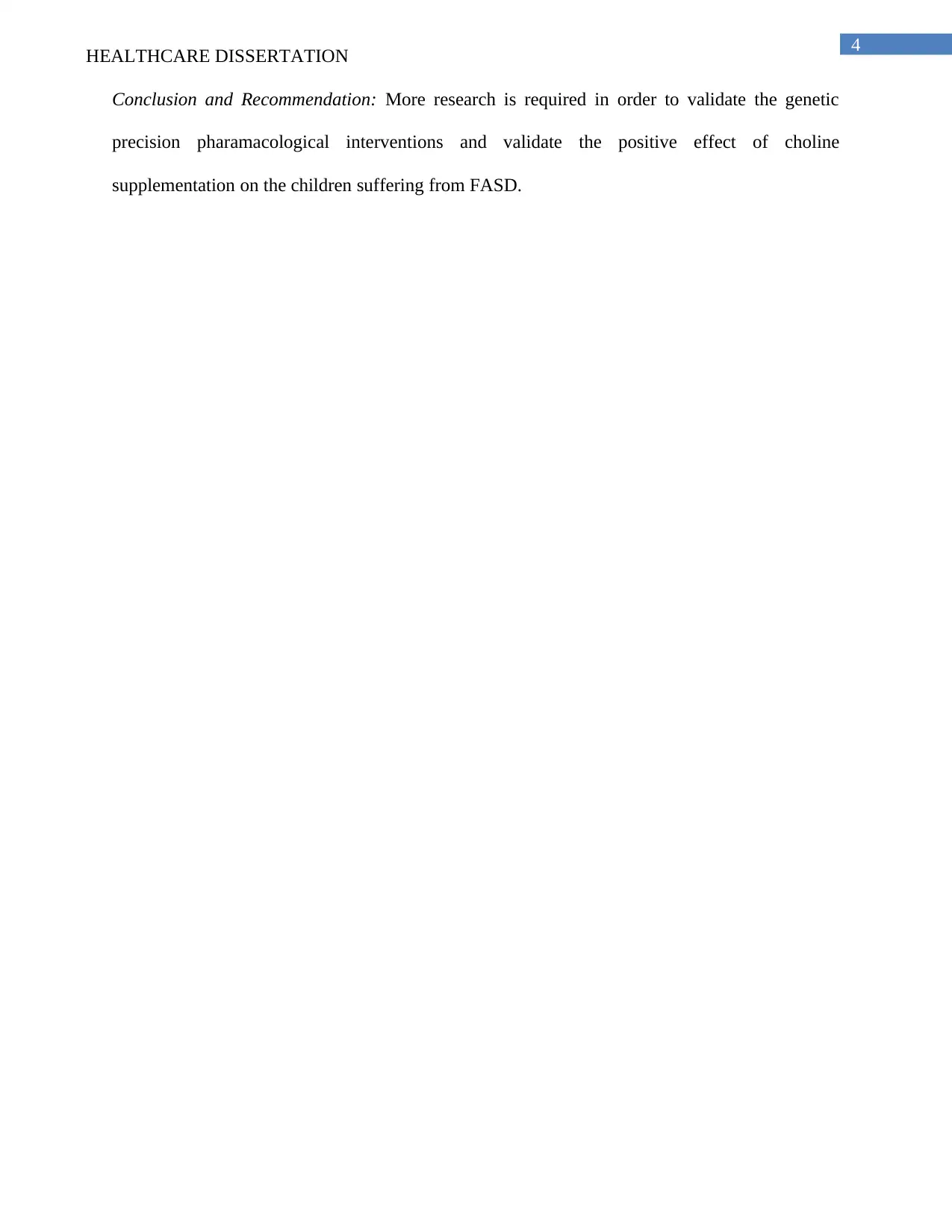
4
HEALTHCARE DISSERTATION
Conclusion and Recommendation: More research is required in order to validate the genetic
precision pharamacological interventions and validate the positive effect of choline
supplementation on the children suffering from FASD.
HEALTHCARE DISSERTATION
Conclusion and Recommendation: More research is required in order to validate the genetic
precision pharamacological interventions and validate the positive effect of choline
supplementation on the children suffering from FASD.
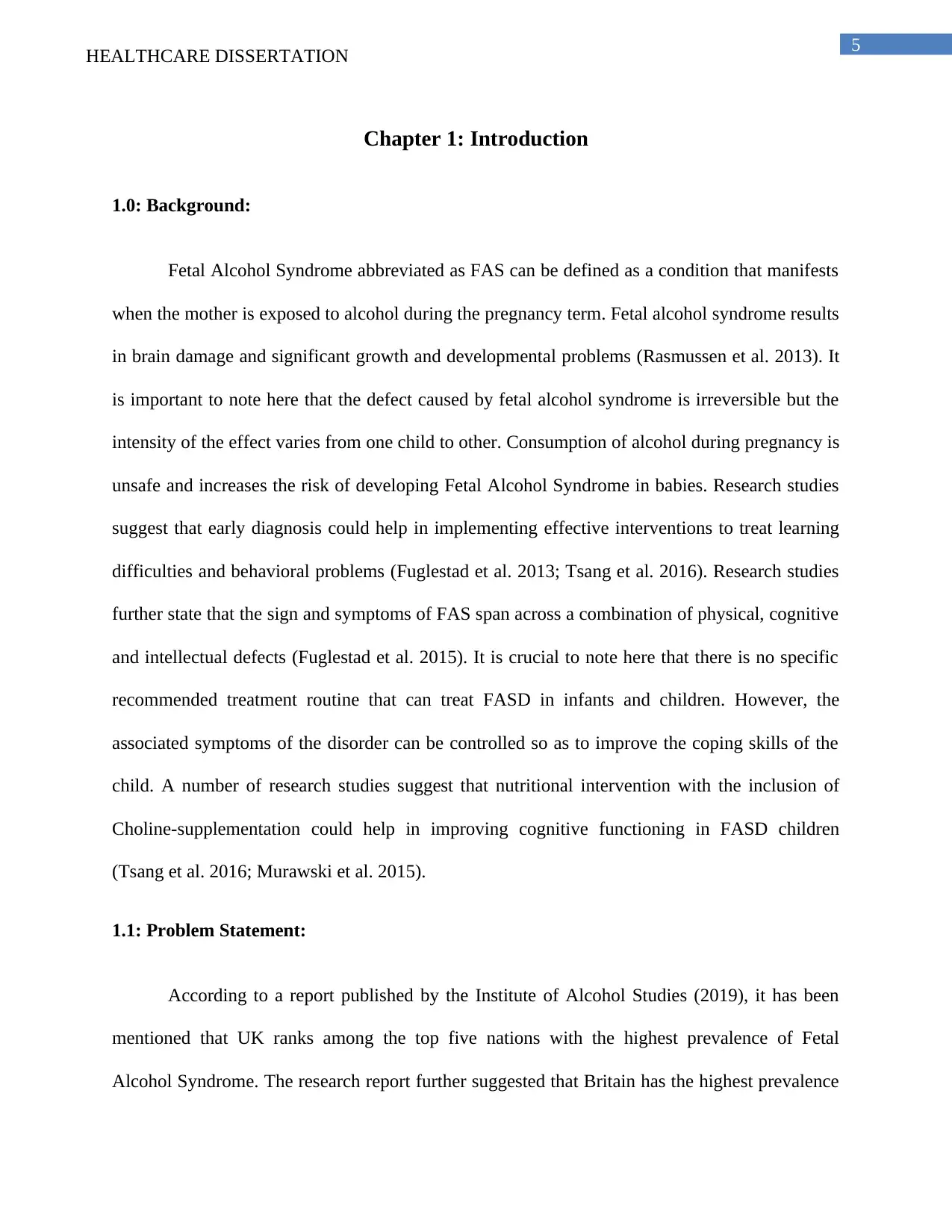
5
HEALTHCARE DISSERTATION
Chapter 1: Introduction
1.0: Background:
Fetal Alcohol Syndrome abbreviated as FAS can be defined as a condition that manifests
when the mother is exposed to alcohol during the pregnancy term. Fetal alcohol syndrome results
in brain damage and significant growth and developmental problems (Rasmussen et al. 2013). It
is important to note here that the defect caused by fetal alcohol syndrome is irreversible but the
intensity of the effect varies from one child to other. Consumption of alcohol during pregnancy is
unsafe and increases the risk of developing Fetal Alcohol Syndrome in babies. Research studies
suggest that early diagnosis could help in implementing effective interventions to treat learning
difficulties and behavioral problems (Fuglestad et al. 2013; Tsang et al. 2016). Research studies
further state that the sign and symptoms of FAS span across a combination of physical, cognitive
and intellectual defects (Fuglestad et al. 2015). It is crucial to note here that there is no specific
recommended treatment routine that can treat FASD in infants and children. However, the
associated symptoms of the disorder can be controlled so as to improve the coping skills of the
child. A number of research studies suggest that nutritional intervention with the inclusion of
Choline-supplementation could help in improving cognitive functioning in FASD children
(Tsang et al. 2016; Murawski et al. 2015).
1.1: Problem Statement:
According to a report published by the Institute of Alcohol Studies (2019), it has been
mentioned that UK ranks among the top five nations with the highest prevalence of Fetal
Alcohol Syndrome. The research report further suggested that Britain has the highest prevalence
HEALTHCARE DISSERTATION
Chapter 1: Introduction
1.0: Background:
Fetal Alcohol Syndrome abbreviated as FAS can be defined as a condition that manifests
when the mother is exposed to alcohol during the pregnancy term. Fetal alcohol syndrome results
in brain damage and significant growth and developmental problems (Rasmussen et al. 2013). It
is important to note here that the defect caused by fetal alcohol syndrome is irreversible but the
intensity of the effect varies from one child to other. Consumption of alcohol during pregnancy is
unsafe and increases the risk of developing Fetal Alcohol Syndrome in babies. Research studies
suggest that early diagnosis could help in implementing effective interventions to treat learning
difficulties and behavioral problems (Fuglestad et al. 2013; Tsang et al. 2016). Research studies
further state that the sign and symptoms of FAS span across a combination of physical, cognitive
and intellectual defects (Fuglestad et al. 2015). It is crucial to note here that there is no specific
recommended treatment routine that can treat FASD in infants and children. However, the
associated symptoms of the disorder can be controlled so as to improve the coping skills of the
child. A number of research studies suggest that nutritional intervention with the inclusion of
Choline-supplementation could help in improving cognitive functioning in FASD children
(Tsang et al. 2016; Murawski et al. 2015).
1.1: Problem Statement:
According to a report published by the Institute of Alcohol Studies (2019), it has been
mentioned that UK ranks among the top five nations with the highest prevalence of Fetal
Alcohol Syndrome. The research report further suggested that Britain has the highest prevalence
⊘ This is a preview!⊘
Do you want full access?
Subscribe today to unlock all pages.

Trusted by 1+ million students worldwide
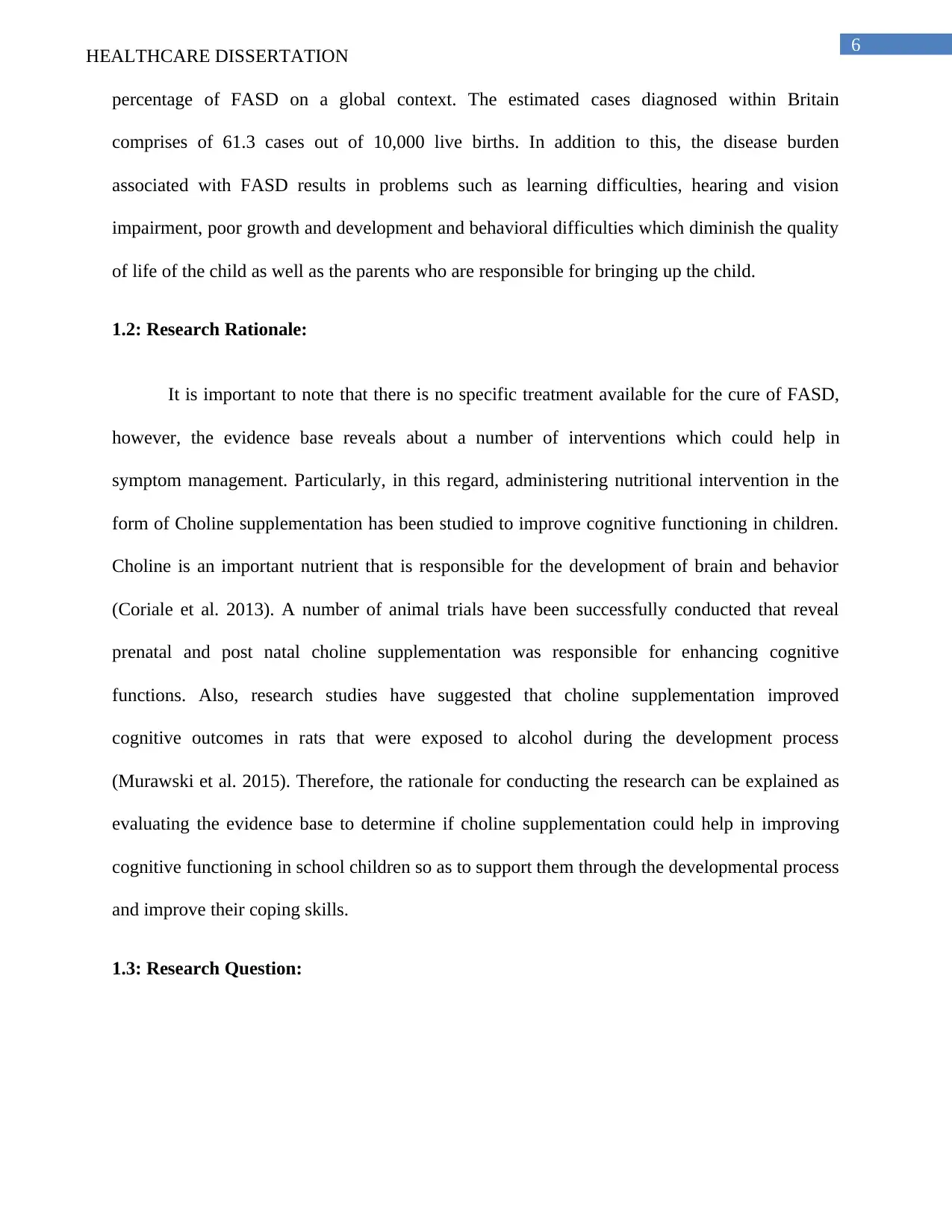
6
HEALTHCARE DISSERTATION
percentage of FASD on a global context. The estimated cases diagnosed within Britain
comprises of 61.3 cases out of 10,000 live births. In addition to this, the disease burden
associated with FASD results in problems such as learning difficulties, hearing and vision
impairment, poor growth and development and behavioral difficulties which diminish the quality
of life of the child as well as the parents who are responsible for bringing up the child.
1.2: Research Rationale:
It is important to note that there is no specific treatment available for the cure of FASD,
however, the evidence base reveals about a number of interventions which could help in
symptom management. Particularly, in this regard, administering nutritional intervention in the
form of Choline supplementation has been studied to improve cognitive functioning in children.
Choline is an important nutrient that is responsible for the development of brain and behavior
(Coriale et al. 2013). A number of animal trials have been successfully conducted that reveal
prenatal and post natal choline supplementation was responsible for enhancing cognitive
functions. Also, research studies have suggested that choline supplementation improved
cognitive outcomes in rats that were exposed to alcohol during the development process
(Murawski et al. 2015). Therefore, the rationale for conducting the research can be explained as
evaluating the evidence base to determine if choline supplementation could help in improving
cognitive functioning in school children so as to support them through the developmental process
and improve their coping skills.
1.3: Research Question:
HEALTHCARE DISSERTATION
percentage of FASD on a global context. The estimated cases diagnosed within Britain
comprises of 61.3 cases out of 10,000 live births. In addition to this, the disease burden
associated with FASD results in problems such as learning difficulties, hearing and vision
impairment, poor growth and development and behavioral difficulties which diminish the quality
of life of the child as well as the parents who are responsible for bringing up the child.
1.2: Research Rationale:
It is important to note that there is no specific treatment available for the cure of FASD,
however, the evidence base reveals about a number of interventions which could help in
symptom management. Particularly, in this regard, administering nutritional intervention in the
form of Choline supplementation has been studied to improve cognitive functioning in children.
Choline is an important nutrient that is responsible for the development of brain and behavior
(Coriale et al. 2013). A number of animal trials have been successfully conducted that reveal
prenatal and post natal choline supplementation was responsible for enhancing cognitive
functions. Also, research studies have suggested that choline supplementation improved
cognitive outcomes in rats that were exposed to alcohol during the development process
(Murawski et al. 2015). Therefore, the rationale for conducting the research can be explained as
evaluating the evidence base to determine if choline supplementation could help in improving
cognitive functioning in school children so as to support them through the developmental process
and improve their coping skills.
1.3: Research Question:
Paraphrase This Document
Need a fresh take? Get an instant paraphrase of this document with our AI Paraphraser
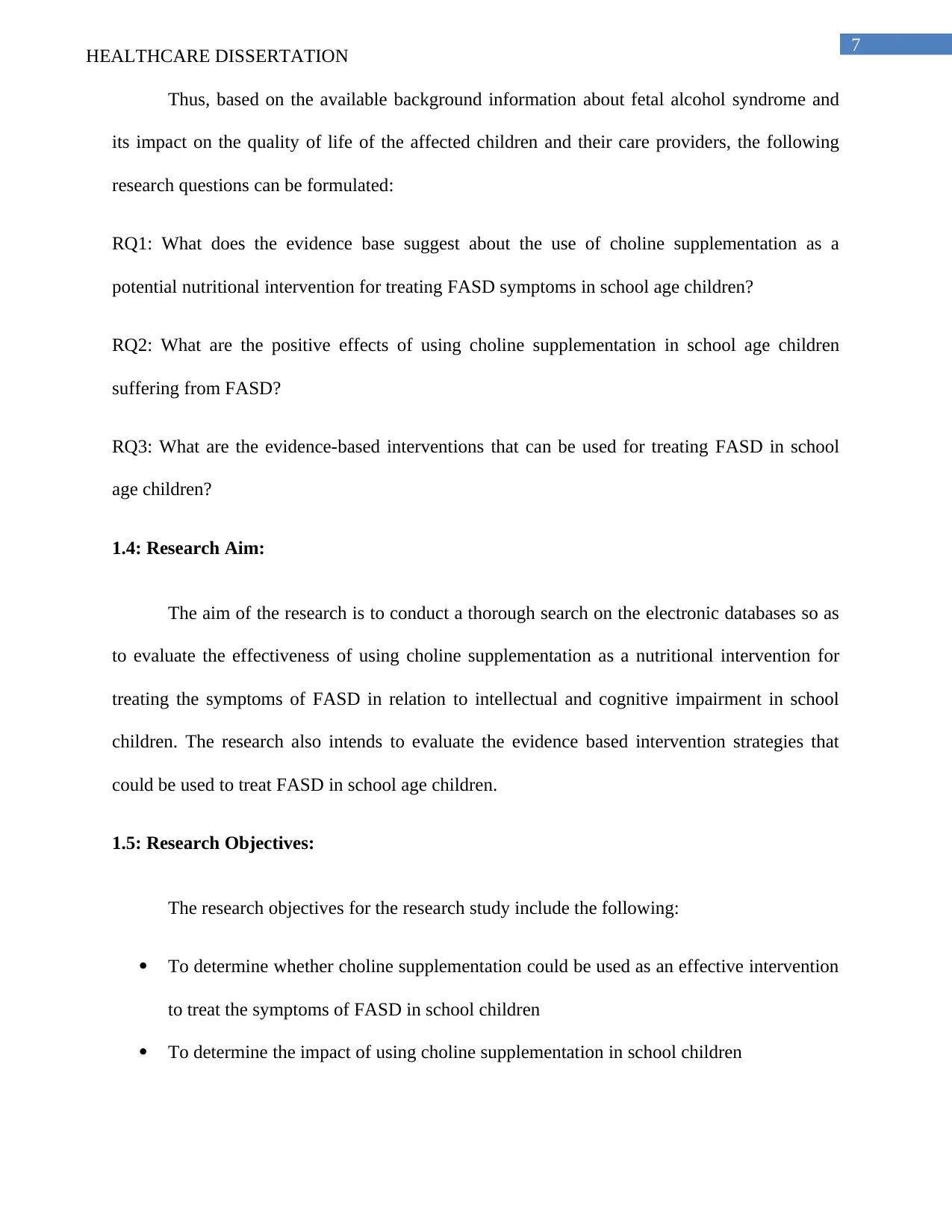
7
HEALTHCARE DISSERTATION
Thus, based on the available background information about fetal alcohol syndrome and
its impact on the quality of life of the affected children and their care providers, the following
research questions can be formulated:
RQ1: What does the evidence base suggest about the use of choline supplementation as a
potential nutritional intervention for treating FASD symptoms in school age children?
RQ2: What are the positive effects of using choline supplementation in school age children
suffering from FASD?
RQ3: What are the evidence-based interventions that can be used for treating FASD in school
age children?
1.4: Research Aim:
The aim of the research is to conduct a thorough search on the electronic databases so as
to evaluate the effectiveness of using choline supplementation as a nutritional intervention for
treating the symptoms of FASD in relation to intellectual and cognitive impairment in school
children. The research also intends to evaluate the evidence based intervention strategies that
could be used to treat FASD in school age children.
1.5: Research Objectives:
The research objectives for the research study include the following:
To determine whether choline supplementation could be used as an effective intervention
to treat the symptoms of FASD in school children
To determine the impact of using choline supplementation in school children
HEALTHCARE DISSERTATION
Thus, based on the available background information about fetal alcohol syndrome and
its impact on the quality of life of the affected children and their care providers, the following
research questions can be formulated:
RQ1: What does the evidence base suggest about the use of choline supplementation as a
potential nutritional intervention for treating FASD symptoms in school age children?
RQ2: What are the positive effects of using choline supplementation in school age children
suffering from FASD?
RQ3: What are the evidence-based interventions that can be used for treating FASD in school
age children?
1.4: Research Aim:
The aim of the research is to conduct a thorough search on the electronic databases so as
to evaluate the effectiveness of using choline supplementation as a nutritional intervention for
treating the symptoms of FASD in relation to intellectual and cognitive impairment in school
children. The research also intends to evaluate the evidence based intervention strategies that
could be used to treat FASD in school age children.
1.5: Research Objectives:
The research objectives for the research study include the following:
To determine whether choline supplementation could be used as an effective intervention
to treat the symptoms of FASD in school children
To determine the impact of using choline supplementation in school children
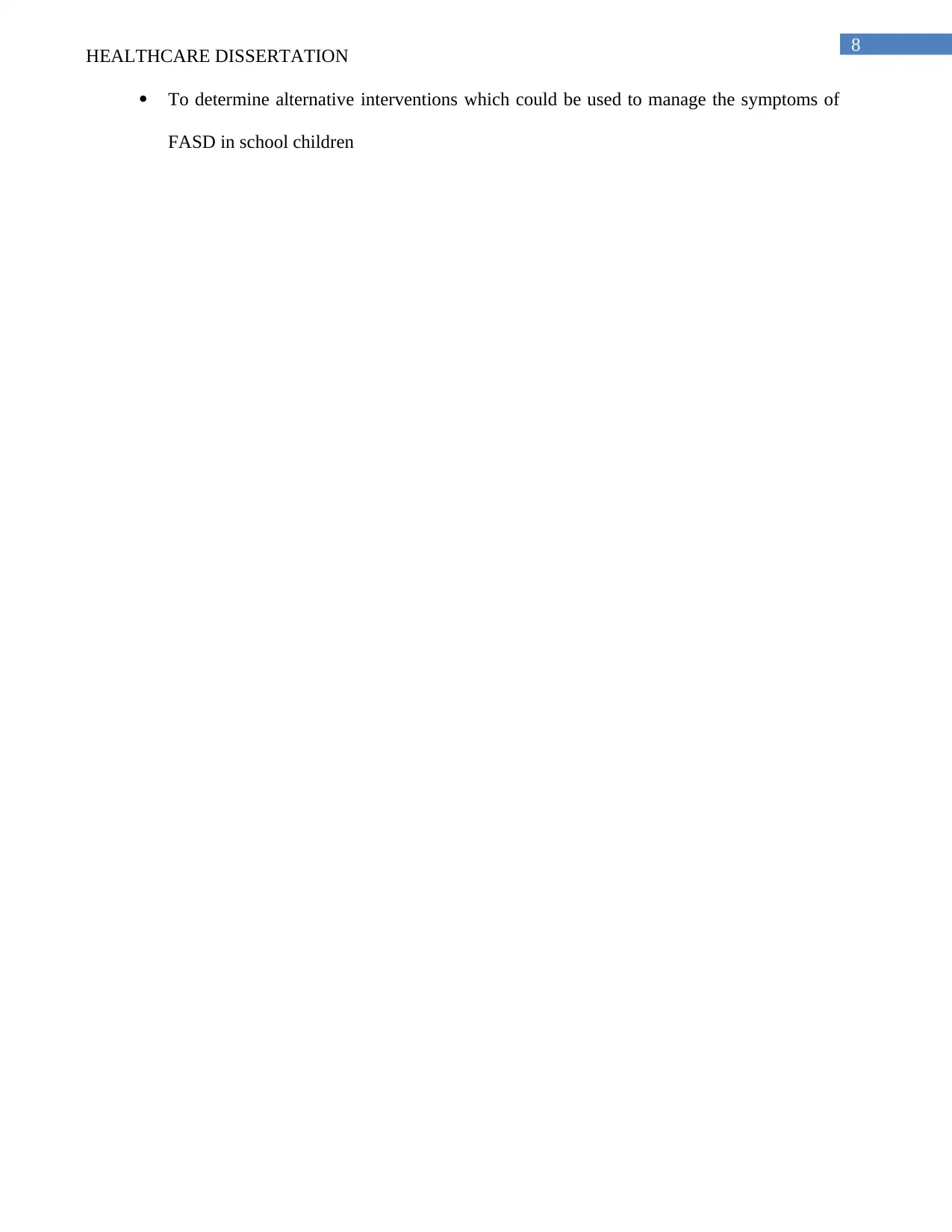
8
HEALTHCARE DISSERTATION
To determine alternative interventions which could be used to manage the symptoms of
FASD in school children
HEALTHCARE DISSERTATION
To determine alternative interventions which could be used to manage the symptoms of
FASD in school children
⊘ This is a preview!⊘
Do you want full access?
Subscribe today to unlock all pages.

Trusted by 1+ million students worldwide
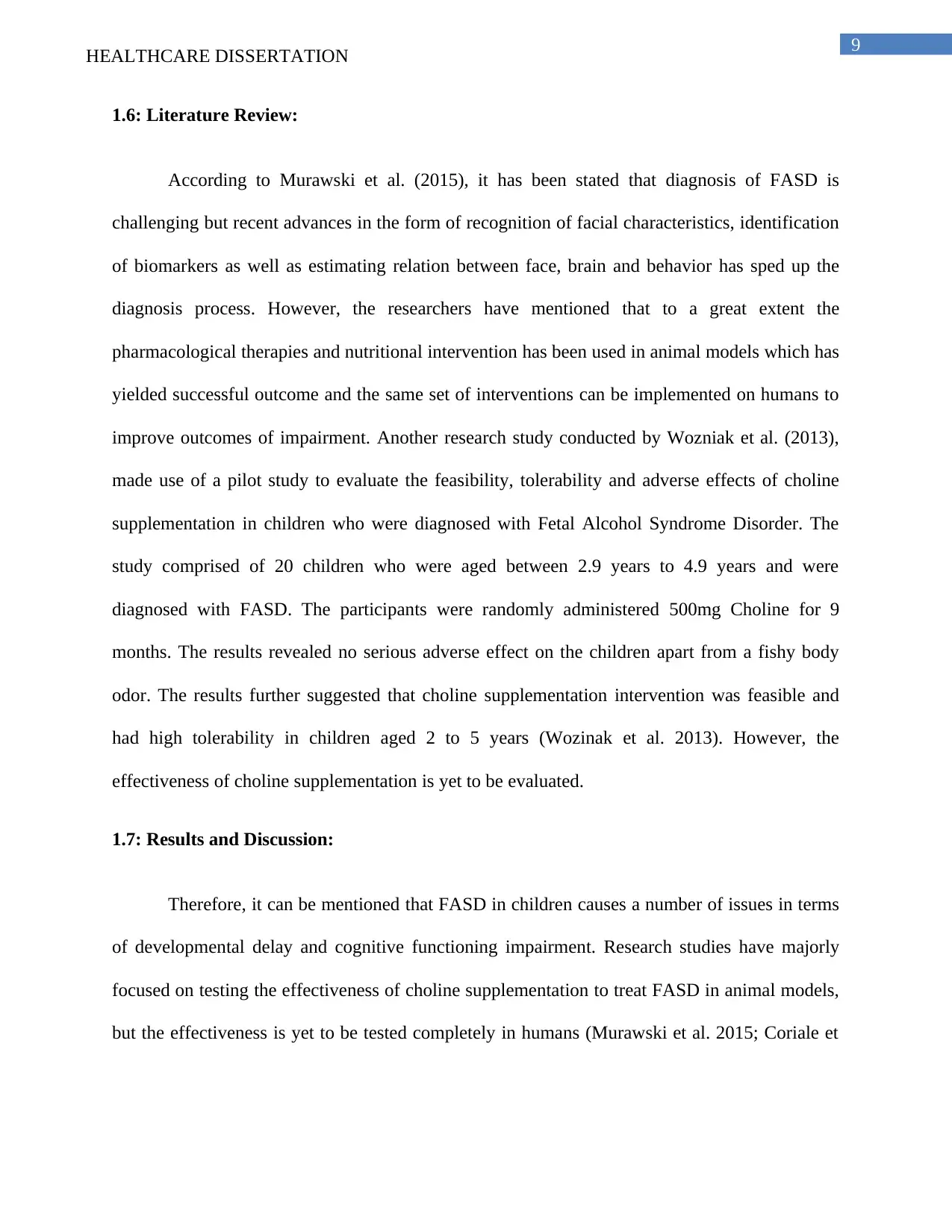
9
HEALTHCARE DISSERTATION
1.6: Literature Review:
According to Murawski et al. (2015), it has been stated that diagnosis of FASD is
challenging but recent advances in the form of recognition of facial characteristics, identification
of biomarkers as well as estimating relation between face, brain and behavior has sped up the
diagnosis process. However, the researchers have mentioned that to a great extent the
pharmacological therapies and nutritional intervention has been used in animal models which has
yielded successful outcome and the same set of interventions can be implemented on humans to
improve outcomes of impairment. Another research study conducted by Wozniak et al. (2013),
made use of a pilot study to evaluate the feasibility, tolerability and adverse effects of choline
supplementation in children who were diagnosed with Fetal Alcohol Syndrome Disorder. The
study comprised of 20 children who were aged between 2.9 years to 4.9 years and were
diagnosed with FASD. The participants were randomly administered 500mg Choline for 9
months. The results revealed no serious adverse effect on the children apart from a fishy body
odor. The results further suggested that choline supplementation intervention was feasible and
had high tolerability in children aged 2 to 5 years (Wozinak et al. 2013). However, the
effectiveness of choline supplementation is yet to be evaluated.
1.7: Results and Discussion:
Therefore, it can be mentioned that FASD in children causes a number of issues in terms
of developmental delay and cognitive functioning impairment. Research studies have majorly
focused on testing the effectiveness of choline supplementation to treat FASD in animal models,
but the effectiveness is yet to be tested completely in humans (Murawski et al. 2015; Coriale et
HEALTHCARE DISSERTATION
1.6: Literature Review:
According to Murawski et al. (2015), it has been stated that diagnosis of FASD is
challenging but recent advances in the form of recognition of facial characteristics, identification
of biomarkers as well as estimating relation between face, brain and behavior has sped up the
diagnosis process. However, the researchers have mentioned that to a great extent the
pharmacological therapies and nutritional intervention has been used in animal models which has
yielded successful outcome and the same set of interventions can be implemented on humans to
improve outcomes of impairment. Another research study conducted by Wozniak et al. (2013),
made use of a pilot study to evaluate the feasibility, tolerability and adverse effects of choline
supplementation in children who were diagnosed with Fetal Alcohol Syndrome Disorder. The
study comprised of 20 children who were aged between 2.9 years to 4.9 years and were
diagnosed with FASD. The participants were randomly administered 500mg Choline for 9
months. The results revealed no serious adverse effect on the children apart from a fishy body
odor. The results further suggested that choline supplementation intervention was feasible and
had high tolerability in children aged 2 to 5 years (Wozinak et al. 2013). However, the
effectiveness of choline supplementation is yet to be evaluated.
1.7: Results and Discussion:
Therefore, it can be mentioned that FASD in children causes a number of issues in terms
of developmental delay and cognitive functioning impairment. Research studies have majorly
focused on testing the effectiveness of choline supplementation to treat FASD in animal models,
but the effectiveness is yet to be tested completely in humans (Murawski et al. 2015; Coriale et
Paraphrase This Document
Need a fresh take? Get an instant paraphrase of this document with our AI Paraphraser
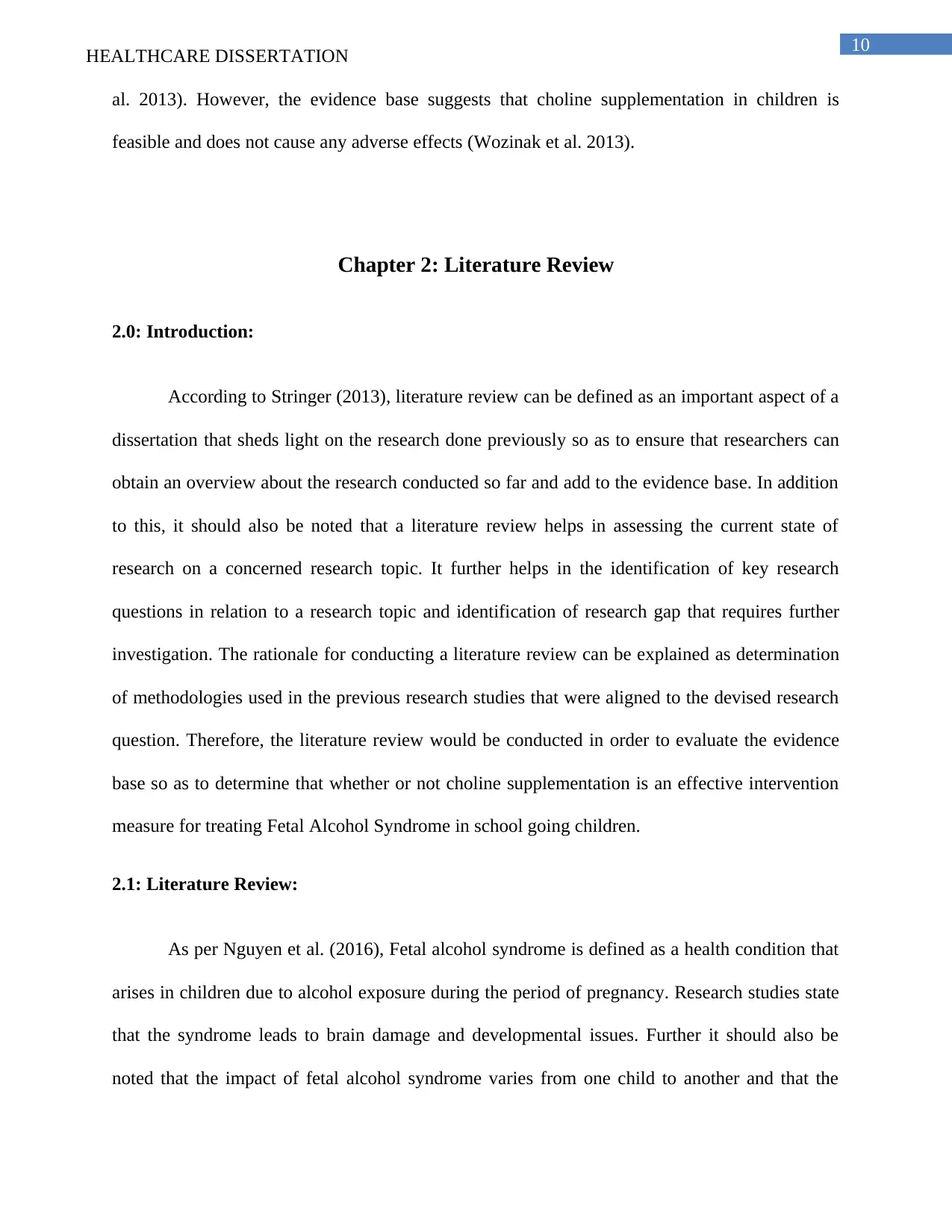
10
HEALTHCARE DISSERTATION
al. 2013). However, the evidence base suggests that choline supplementation in children is
feasible and does not cause any adverse effects (Wozinak et al. 2013).
Chapter 2: Literature Review
2.0: Introduction:
According to Stringer (2013), literature review can be defined as an important aspect of a
dissertation that sheds light on the research done previously so as to ensure that researchers can
obtain an overview about the research conducted so far and add to the evidence base. In addition
to this, it should also be noted that a literature review helps in assessing the current state of
research on a concerned research topic. It further helps in the identification of key research
questions in relation to a research topic and identification of research gap that requires further
investigation. The rationale for conducting a literature review can be explained as determination
of methodologies used in the previous research studies that were aligned to the devised research
question. Therefore, the literature review would be conducted in order to evaluate the evidence
base so as to determine that whether or not choline supplementation is an effective intervention
measure for treating Fetal Alcohol Syndrome in school going children.
2.1: Literature Review:
As per Nguyen et al. (2016), Fetal alcohol syndrome is defined as a health condition that
arises in children due to alcohol exposure during the period of pregnancy. Research studies state
that the syndrome leads to brain damage and developmental issues. Further it should also be
noted that the impact of fetal alcohol syndrome varies from one child to another and that the
HEALTHCARE DISSERTATION
al. 2013). However, the evidence base suggests that choline supplementation in children is
feasible and does not cause any adverse effects (Wozinak et al. 2013).
Chapter 2: Literature Review
2.0: Introduction:
According to Stringer (2013), literature review can be defined as an important aspect of a
dissertation that sheds light on the research done previously so as to ensure that researchers can
obtain an overview about the research conducted so far and add to the evidence base. In addition
to this, it should also be noted that a literature review helps in assessing the current state of
research on a concerned research topic. It further helps in the identification of key research
questions in relation to a research topic and identification of research gap that requires further
investigation. The rationale for conducting a literature review can be explained as determination
of methodologies used in the previous research studies that were aligned to the devised research
question. Therefore, the literature review would be conducted in order to evaluate the evidence
base so as to determine that whether or not choline supplementation is an effective intervention
measure for treating Fetal Alcohol Syndrome in school going children.
2.1: Literature Review:
As per Nguyen et al. (2016), Fetal alcohol syndrome is defined as a health condition that
arises in children due to alcohol exposure during the period of pregnancy. Research studies state
that the syndrome leads to brain damage and developmental issues. Further it should also be
noted that the impact of fetal alcohol syndrome varies from one child to another and that the
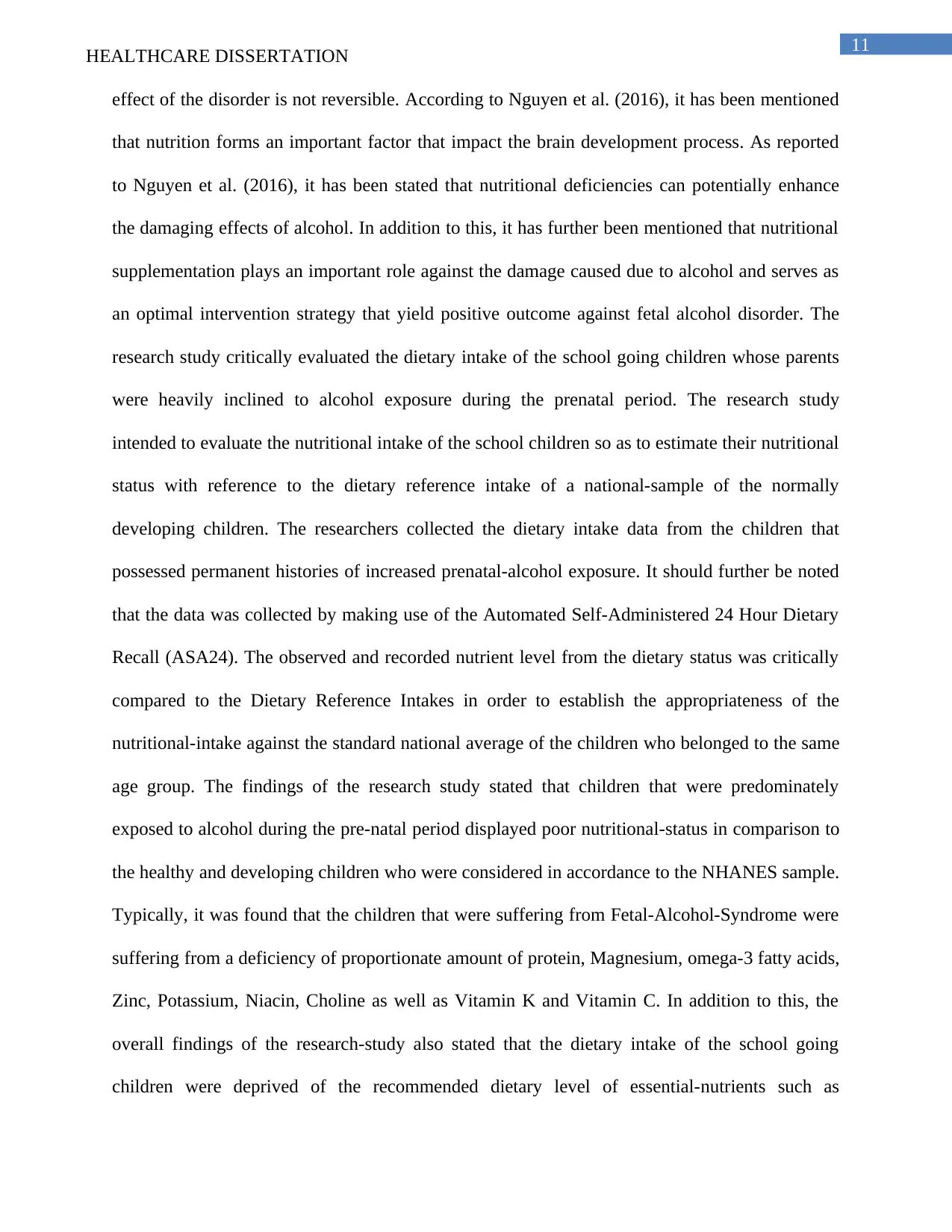
11
HEALTHCARE DISSERTATION
effect of the disorder is not reversible. According to Nguyen et al. (2016), it has been mentioned
that nutrition forms an important factor that impact the brain development process. As reported
to Nguyen et al. (2016), it has been stated that nutritional deficiencies can potentially enhance
the damaging effects of alcohol. In addition to this, it has further been mentioned that nutritional
supplementation plays an important role against the damage caused due to alcohol and serves as
an optimal intervention strategy that yield positive outcome against fetal alcohol disorder. The
research study critically evaluated the dietary intake of the school going children whose parents
were heavily inclined to alcohol exposure during the prenatal period. The research study
intended to evaluate the nutritional intake of the school children so as to estimate their nutritional
status with reference to the dietary reference intake of a national-sample of the normally
developing children. The researchers collected the dietary intake data from the children that
possessed permanent histories of increased prenatal-alcohol exposure. It should further be noted
that the data was collected by making use of the Automated Self-Administered 24 Hour Dietary
Recall (ASA24). The observed and recorded nutrient level from the dietary status was critically
compared to the Dietary Reference Intakes in order to establish the appropriateness of the
nutritional-intake against the standard national average of the children who belonged to the same
age group. The findings of the research study stated that children that were predominately
exposed to alcohol during the pre-natal period displayed poor nutritional-status in comparison to
the healthy and developing children who were considered in accordance to the NHANES sample.
Typically, it was found that the children that were suffering from Fetal-Alcohol-Syndrome were
suffering from a deficiency of proportionate amount of protein, Magnesium, omega-3 fatty acids,
Zinc, Potassium, Niacin, Choline as well as Vitamin K and Vitamin C. In addition to this, the
overall findings of the research-study also stated that the dietary intake of the school going
children were deprived of the recommended dietary level of essential-nutrients such as
HEALTHCARE DISSERTATION
effect of the disorder is not reversible. According to Nguyen et al. (2016), it has been mentioned
that nutrition forms an important factor that impact the brain development process. As reported
to Nguyen et al. (2016), it has been stated that nutritional deficiencies can potentially enhance
the damaging effects of alcohol. In addition to this, it has further been mentioned that nutritional
supplementation plays an important role against the damage caused due to alcohol and serves as
an optimal intervention strategy that yield positive outcome against fetal alcohol disorder. The
research study critically evaluated the dietary intake of the school going children whose parents
were heavily inclined to alcohol exposure during the prenatal period. The research study
intended to evaluate the nutritional intake of the school children so as to estimate their nutritional
status with reference to the dietary reference intake of a national-sample of the normally
developing children. The researchers collected the dietary intake data from the children that
possessed permanent histories of increased prenatal-alcohol exposure. It should further be noted
that the data was collected by making use of the Automated Self-Administered 24 Hour Dietary
Recall (ASA24). The observed and recorded nutrient level from the dietary status was critically
compared to the Dietary Reference Intakes in order to establish the appropriateness of the
nutritional-intake against the standard national average of the children who belonged to the same
age group. The findings of the research study stated that children that were predominately
exposed to alcohol during the pre-natal period displayed poor nutritional-status in comparison to
the healthy and developing children who were considered in accordance to the NHANES sample.
Typically, it was found that the children that were suffering from Fetal-Alcohol-Syndrome were
suffering from a deficiency of proportionate amount of protein, Magnesium, omega-3 fatty acids,
Zinc, Potassium, Niacin, Choline as well as Vitamin K and Vitamin C. In addition to this, the
overall findings of the research-study also stated that the dietary intake of the school going
children were deprived of the recommended dietary level of essential-nutrients such as
⊘ This is a preview!⊘
Do you want full access?
Subscribe today to unlock all pages.

Trusted by 1+ million students worldwide
1 out of 46
Related Documents
Your All-in-One AI-Powered Toolkit for Academic Success.
+13062052269
info@desklib.com
Available 24*7 on WhatsApp / Email
![[object Object]](/_next/static/media/star-bottom.7253800d.svg)
Unlock your academic potential
Copyright © 2020–2026 A2Z Services. All Rights Reserved. Developed and managed by ZUCOL.





